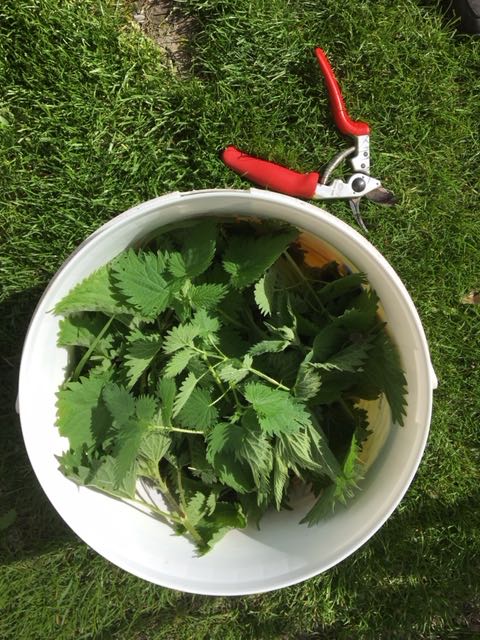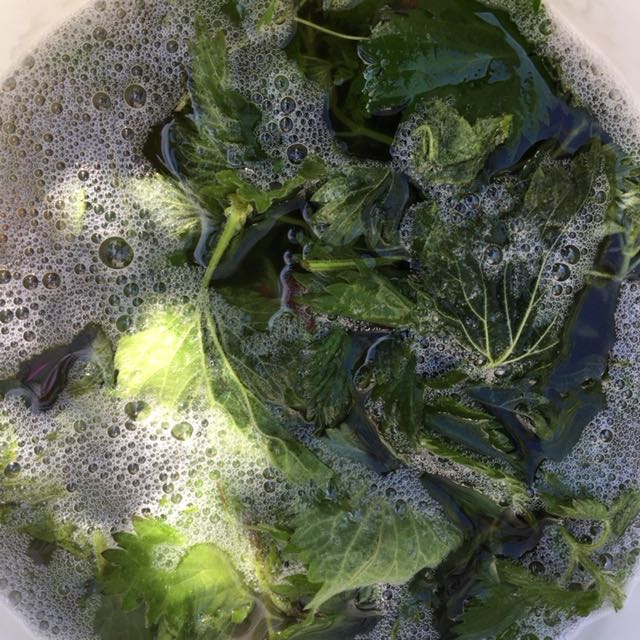Nettles,
they grow very easily in my garden. I pull them out as much as I can, but
sometimes I miss a few. But, that appears not to be too bad......
During the
open garden days, a passionate young gardener sits down at the table in the
barn. He tells us about his organic garden. Quickly he gets his mobile and
shows some pictures of his house and garden. We recognize his house; he lives only
a village away.
His garden
is tastefully decorated. Enthusiastically he tells about the liquid nettle
manure, he brews himself. He sprays all the roses with this manure and because
of that they do no longer suffer from rust.
Nettle
manure? No rust? That is something my 'New Dawn' rose needs. This rose is very
sensitive to rust. After the first flush the rose looks like a supporter of the Dutch football team! All orange.
The young
gardener reveals his recipe for this stinging nettle manure:
Cut 10 cm
long tops of stinging nettles (gloves on)
Put the
tops in a bucket. Use a bucket preferably with a lid.
Pour
rainwater on the nettles and close the lid.
Shake or
stir every day.
As soon as the
liquid bubbles no more, it is ready.
Strain the
liquid through a cloth and store it into bottles.
Dilute the fertilizer
before use in the ratio 1:10
The next week
I started making nettle manure. Luckily I found a discarded bucket with a lid in
the barn. Next I cut off all nettle tops that are in my garden. I must confess
there are plenty nettles to fill a bucket. Finally, I scoop some water from the
rain well. Ready!
Every day I
shake the bucket. Soon the liquid starts to ferment. After about 10 days the
liquid is calm and has a brown colour. The manure is ready. Next I only have to
pass it through a cloth. To speed up this process I press the liquid down with
my hand. I regret this immediately, because my hand stinks awfully! Even some
perfume cannot mask this smell.
But a small
sacrifice for a rose without rust!
Use a bucket with a lid.
Cut 10 cm long tops of stinging nettles (gloves on)
Pour rainwater on the nettles and close the lid.
Smelly water!
Strain the liquid through a cloth and store it in bottles.
I do it for a rose without rust!







Dear Hetty,
ReplyDeleteI have heard about nettle manure before and I remember my mum brewing some many years ago. I have never tried it myself though. Luckily, I very rarely have problems with rose diseases. No problems with rust or so. However, I have problems with pests. Every year some of my rose buds and new shoots are attacked by caterpillars and other insects and rose buds get eaten off or damaged. This year I had the same problem again. So I went to the garden centre with the damaged shoots and buds. The gardener there told me that my rose buds are damaged by the "Rosentriebbohrer". I don´t know what this is called in English, but it is some kind of wasp that stings the new rose shoots and thereby lays an egg inside the rose shoot. A little worm/caterpillar hatches from the egg and then lives from the rose shoots and buds. I asked the gardener if nettle manure might help get rid of this naughty insect. Unfortunately he told me that there is no biological way to get rid of them. He offered me some strong insecticides, but I didn´t take them as I don´t want to spray with anything that´s poisonous for bees and other pollinators. So I cut all the damaged buds and shoots and hope that next year they won´t come back.
I wish you good luck with the nettle manure and your New Dawn rose! I too have a New Dawn rose in my garden.
Best wishes,
Lisa
I always try to remove the rose leaves that are effected by the caterpillar. A lot of work, but it helps. Groetjes Hetty
DeleteAnother fan of New Dawn here! I have her on the north-western side of my house, so she doesn't get any sun much of the year, but she still blooms profusely in spring and summer. Here in our dry climate, she is quite healthy.
ReplyDeleteLike your young gardener friend, I would like to consider myself an organic gardener, also. Although, perhaps more of a "lazy organic" gardener, because I don't really do much more than water, prune and weed. I am interested in trying the nettle "tea", though, so please let us know how it works for you, Hetty.
Lovely to see your garden looking as splendid as always!
Karen